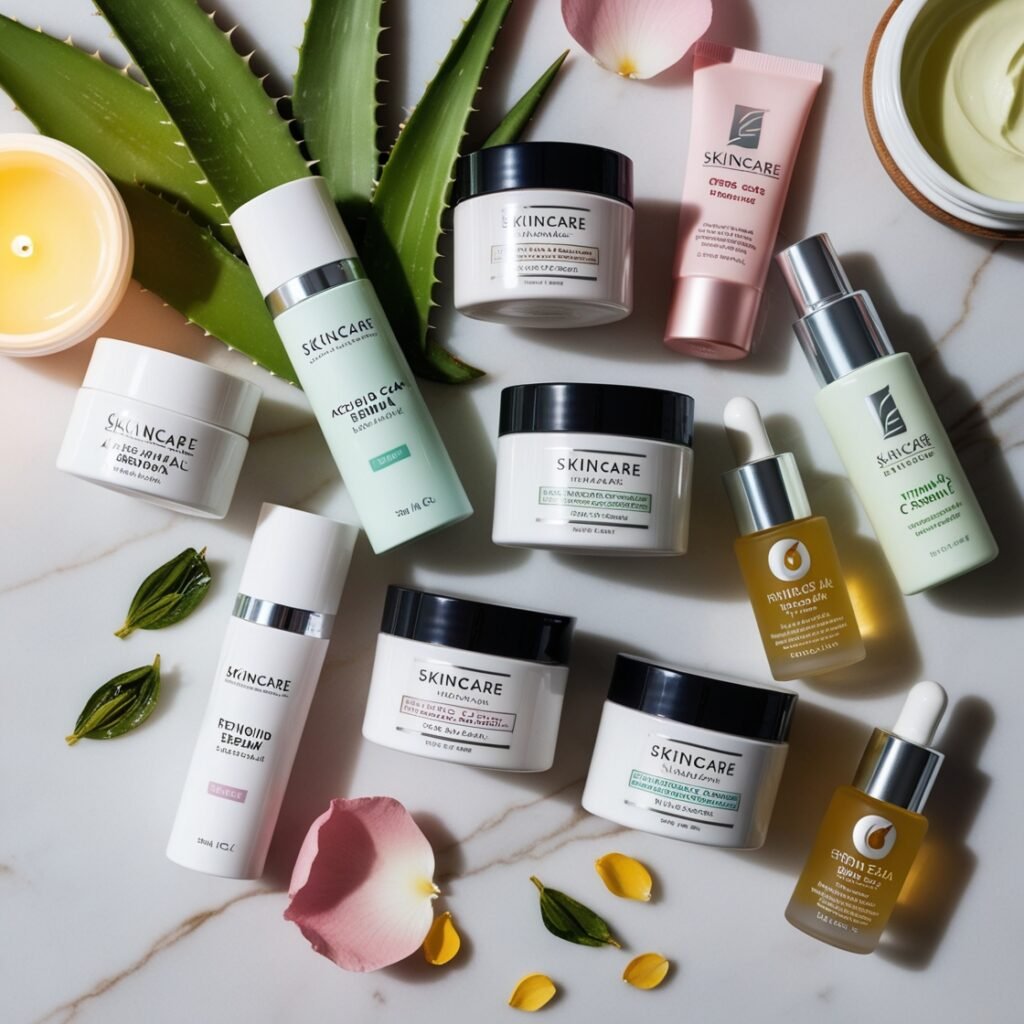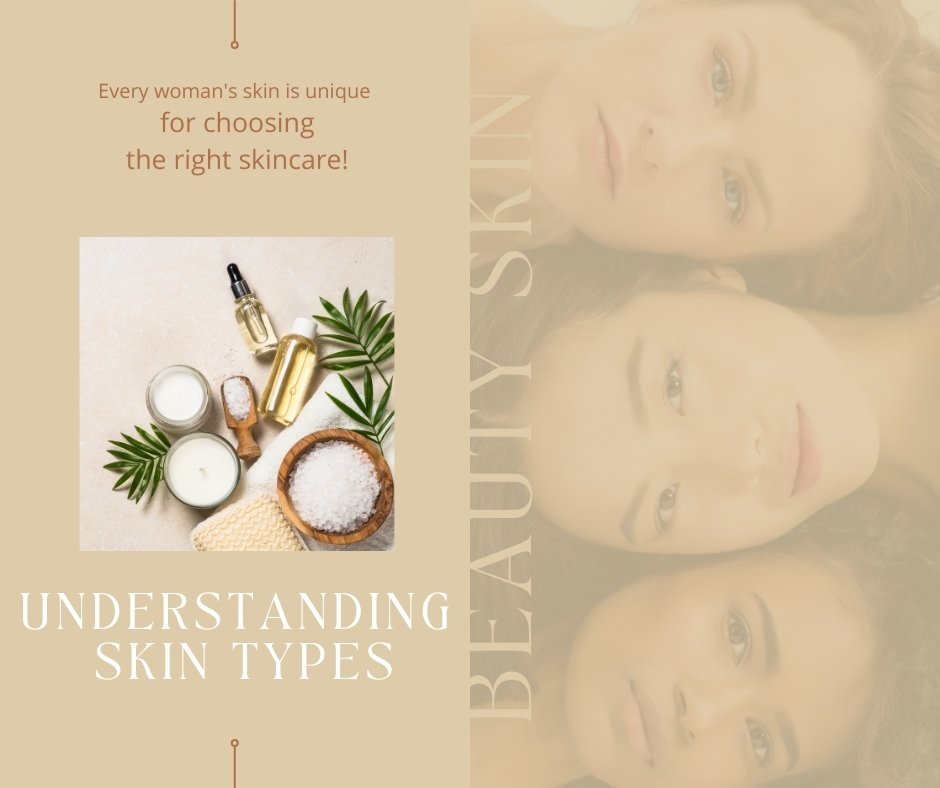Acne scars can be a stubborn reminder of past breakouts, affecting both your skin’s appearance and your confidence. For many people, finding the right solution to reduce or eliminate these scars is essential. One of the most popular and effective methods is using acne scar removal creams. In this guide, we’ll take a deep dive into the best creams for acne scars, how they work, and what to consider when choosing one. Whether you’re looking for a fast fix or a gradual solution, this article will help you find the best option for smoother, clearer skin.
Table of Contents
Introduction
Acne scars are one of the most frustrating skin concerns to deal with. Even after your acne clears up, the scars left behind can persist for months or even years. Acne scar removal creams have become a go-to solution for those who want to treat scars without expensive treatments like laser therapy or chemical peels. These creams contain powerful ingredients that target scars, helping to fade their appearance over time.
Acne Scar Removal Cream
What Causes Acne Scars?
Acne scars form when your skin’s tissue is damaged during the healing process. When the skin is inflamed from a pimple, cyst, or nodule, it can destroy healthy tissue. The body tries to repair this damage by producing collagen, but the amount produced may be either too little or too much, leading to scars.
There are different types of acne scars:
- Atrophic scars: These appear as small indentations in the skin and are caused by a loss of tissue.
- Hypertrophic scars: These are raised scars that form when too much collagen is produced during healing.
- Dark spots (Post-Inflammatory Hyperpigmentation): These are not true scars but rather discolorations left behind by acne.
The good news is that acne scar removal creams can help address all of these types, though they work best on mild to moderate scars.
How Do Acne Scar Removal Creams Work?
Acne scar removal creams are designed to improve the texture and appearance of your skin by targeting damaged areas. Here’s how they typically work:
- Exfoliation: Many creams contain exfoliating ingredients like alpha hydroxy acids (AHAs) or retinoids. These substances help to slough off dead skin cells, revealing new, healthy skin beneath and promoting faster cell turnover.
- Collagen Production: Some creams, especially those containing retinoids or peptides, stimulate collagen production. Collagen is a protein that helps to fill in indented scars, making the skin smoother.
- Skin Lightening: If you’re dealing with post-inflammatory hyperpigmentation (dark spots), creams with vitamin C or niacinamide can help lighten these areas over time.
- Moisturization and Healing: Silicone-based creams and hydrating agents like hyaluronic acid keep the skin moisturized, which is essential for scar healing and preventing further damage.
Types of Acne Scar Removal Creams
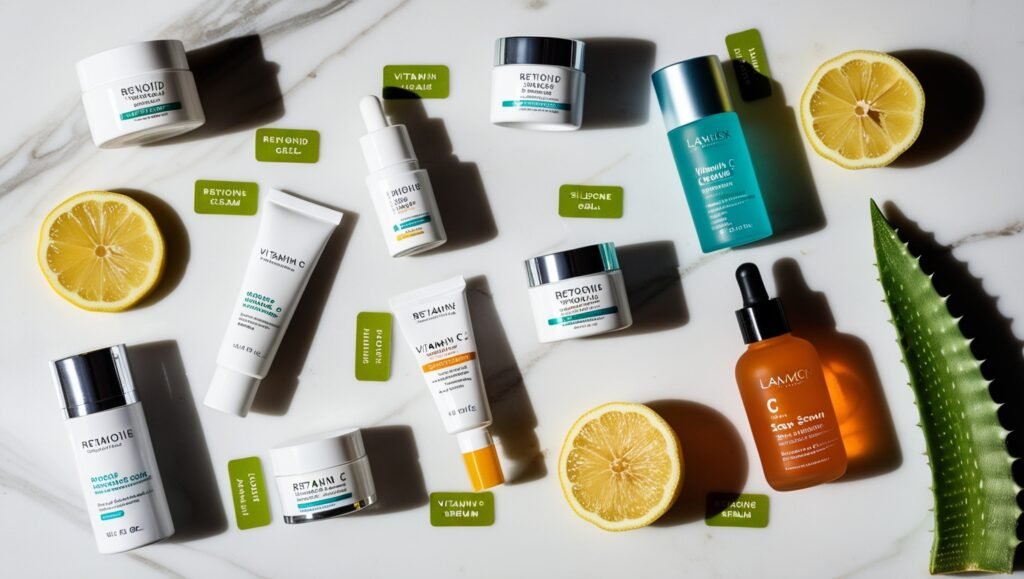
Choosing the right cream for acne scars depends on your skin type, the severity of your scars, and your overall skincare routine. Here are the most common types of acne scar removal creams:
1. Retinoid Creams
Retinoids are derived from vitamin A and are known for their ability to speed up cell turnover and boost collagen production. They’re highly effective in treating atrophic scars and improving overall skin texture.
- Example: Retin-A, Differin
- Best For: Treating indented scars and improving skin texture.
2. Silicone-Based Creams
Silicone-based creams work by forming a protective barrier over the scar, which helps to retain moisture and smooth out the skin. These creams are especially effective on hypertrophic scars.
- Example: Mederma, ScarAway
- Best For: Raised scars and keeping the skin moisturized.
3. Vitamin C Creams
Vitamin C is a powerful antioxidant that helps brighten the skin and fade dark spots caused by acne. It also plays a role in collagen synthesis, making it an excellent choice for fading acne scars.
- Example: TruSkin Vitamin C Serum, Derma E Vitamin C Intense Night Cream
- Best For: Post-inflammatory hyperpigmentation and boosting collagen.
4. Alpha Hydroxy Acids (AHAs)
AHAs, such as glycolic acid and lactic acid, are exfoliants that remove dead skin cells and improve skin texture. They’re often used to treat mild atrophic scars and pigmentation issues.
- Example: The Ordinary Glycolic Acid 7% Toning Solution
- Best For: Mild acne scars and dark spots.
5. Natural Acne Scar Removal Creams
For those who prefer a more holistic approach, natural creams containing ingredients like aloe vera, honey, tea tree oil, and rosehip oil can help reduce the appearance of scars without harsh chemicals.
- Example: Bio-Oil, Burt’s Bees Natural Acne Solutions
- Best For: Sensitive skin and those looking for gentle, natural solutions.
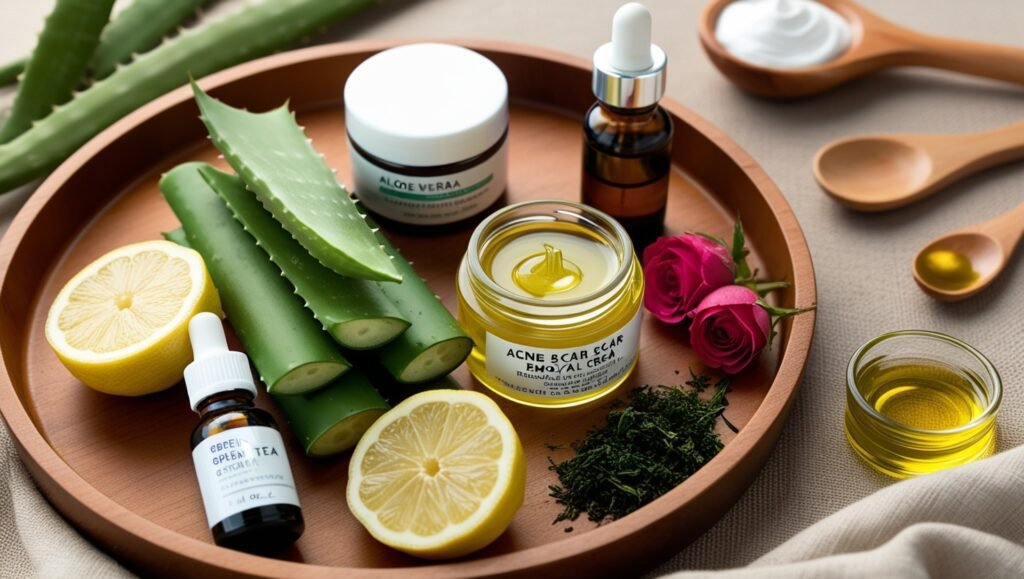
Top 5 Acne Scar Removal Creams for 2024
If you’re looking to invest in a good acne scar removal cream, here are five of the top options for 2024:
| Product Name | Key Ingredients | Best For | Price Range |
|---|---|---|---|
| Mederma Advanced Scar Gel | Silicone, Allantoin | Hypertrophic scars | $15-$25 |
| Differin Gel | Retinoid (Adapalene) | Atrophic scars, texture issues | $12-$20 |
| TruSkin Vitamin C Serum | Vitamin C, Hyaluronic Acid | Dark spots, collagen boosting | $20-$30 |
| The Ordinary Glycolic Acid | Glycolic Acid (AHA) | Mild scars, skin brightening | $7-$10 |
| Bio-Oil | Natural oils (Rosehip, Vitamin E) | Dark spots, overall skin healing | $10-$20 |
These products are widely recommended for their ability to fade scars and improve overall skin tone with consistent use.
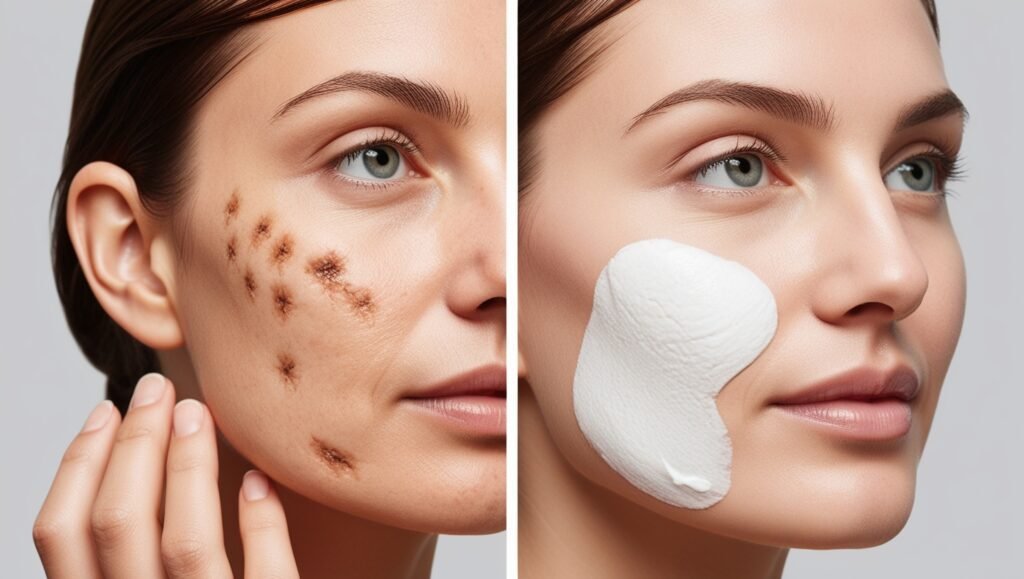
Statistics on Acne and Scar Treatments
To give you a better understanding of how prevalent acne scars are and how treatments like creams are used, here are some statistics:
- Acne prevalence: About 85% of people aged 12-24 experience acne, with around 20% developing moderate to severe acne that leads to scarring.
- Scar formation: 1 in 5 people who suffer from acne develop scars.
- Scar treatments: According to a study, 60% of people with acne scars prefer using topical treatments like creams, with 30% opting for professional treatments like laser therapy.
- Consumer preference: A 2023 survey found that 70% of people dealing with acne scars have tried or are interested in using scar removal creams due to their affordability and non-invasive nature.
- Cream effectiveness: Retinoid creams have been shown to improve the appearance of atrophic scars by 35% to 50% with consistent use over six months.
Pros & Cons of Using Acne Scar Removal Creams
| Pros | Cons |
|---|---|
| Non-invasive and easy to use | May take months to see noticeable results |
| Affordable compared to professional treatments | Results can vary depending on scar severity |
| Available over-the-counter | Some creams can cause skin irritation |
| Can be used in combination with other skincare products | Requires daily consistency for the best results |
| Great for mild to moderate scars | Deep, severe scars may need stronger interventions |
Frequently Asked Questions (FAQs)
Q1: How long does it take to see results from acne scar removal creams?
A: Results vary depending on the severity of your scars and the type of cream you’re using. On average, it can take anywhere from 6 weeks to 6 months to see noticeable improvements. Consistency is key.
Q2: Are these creams safe for all skin types?
A: Most acne scar removal creams are formulated to be safe for all skin types. However, if you have sensitive skin, it’s important to patch-test a small area first and choose creams with fewer harsh ingredients, like natural or silicone-based creams.
Q3: Can I use these creams with other skincare products?
A: Yes! Many scar removal creams can be incorporated into your daily skincare routine. Just make sure you’re not combining too many active ingredients (like retinoids and AHAs) that could irritate your skin.
Q4: Do acne scar removal creams work on older scars?
A: While newer scars tend to respond better to treatment, older scars can still show improvement with consistent use of products containing retinoids or silicone.
Q5: What if my scars don’t improve with creams?
A: If you don’t see results after 6-12 months, you may want to consider professional treatments such as micro-needling, laser therapy, or chemical peels.
Conclusion
Acne scar removal creams can be an effective, affordable way to address unwanted scars. With a variety of options available, from retinoid-based creams to natural solutions, there’s something for every skin type and scar severity. Patience and consistency are crucial, as results take time, but with the right cream, you can smooth out your skin and boost your confidence.
When choosing an acne scar removal cream, always consider your specific skin needs and consult with a dermatologist if you’re unsure which product is best for you. With dedication, your acne scars can become a thing of the past.
References
- American Academy of Dermatology (AAD)—”Acne scars: Treatment options”
- National Institutes of Health (NIH): “Topical retinoids in the treatment of acne vulgaris and acne scarring”
- Journal of Clinical and Aesthetic Dermatology (JCAD): “Treatments for acne scarring: Efficacy of over-the-counter options”
- Statista: “Prevalence of acne and scar treatments”
- Dermatology Times: “Silicone gel sheeting for the treatment of hypertrophic scars and keloids.”

